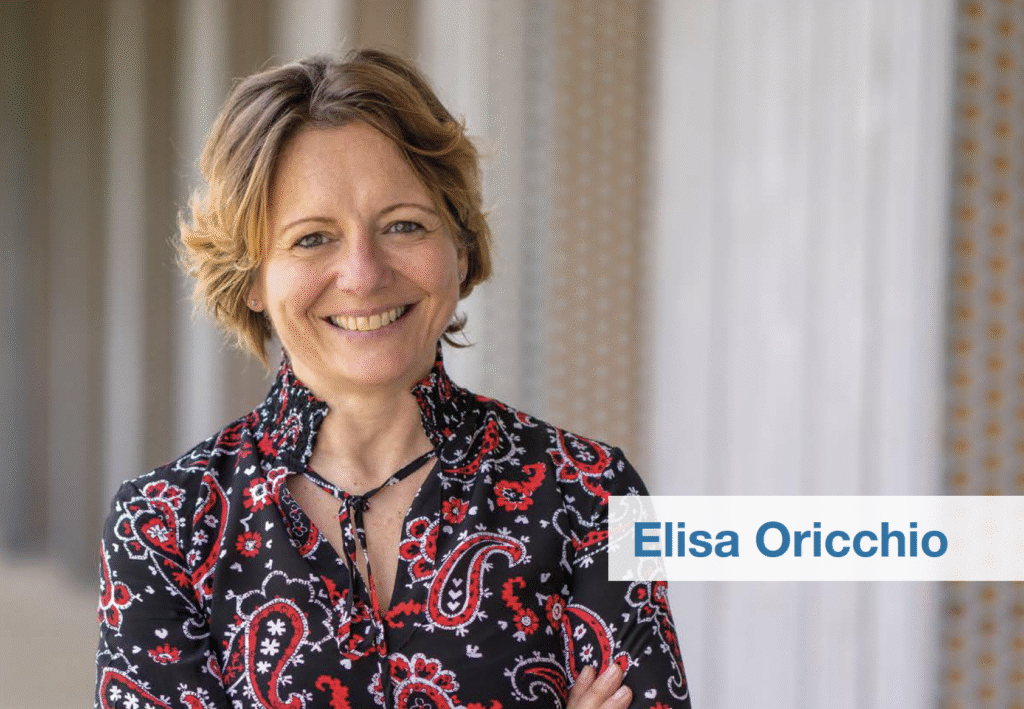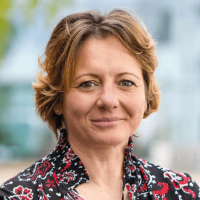Success Story
Improving Personalized Cancer Treatment— A Very Personal Cancer Journey
Elisa Oricchio
Bridging the gap between basic and clinical research is essential for innovation in oncology, says Elisa Oricchio, who focusses on lymphoma and solid tumors like lung cancer
When Elisa Oricchio joined the EPFL 10 years ago, a spirit of change and optimism was in the air. The Swiss Cancer Center Léman, a collaborative initiative involving EPFL, the University Hospitals of Lausanne (CHUV) and Geneva (HUG), was just taking shape. The brand-new AGORA building, adjacent to the hospital, housed researchers from all these institutions to foster the link between basic and clinical research. For Oricchio, who had done her postdoctoral research at the Memorial Sloan Kettering Cancer Center, one of the world’s leading cancer research centers, the EPFL was the perfect place to start her own research group and contribute to a growing research ecosystem focused on translational oncology.

“When a cancer patient suffers a relapse after the first line of therapy, the clinician faces the problem of deciding which therapy is the best for this patient.”
From southern Italy to Lausanne
Oricchio is sitting at her desk in her office at the EPFL. On the wall behind her are two drawings, one of Marie Curie’s office and one of Curie’s lab. Wearing a green sweater, Oricchio’s friendly eyes sparkle as she recounts the journey of her life.
Her path to cancer research was by no means straightforward, she tells us. Born in a little town south of Naples to a large and supportive family, she was the first one to go to university. During her studies in Rome, she was fascinated by physics and read the biographies of Enrico Fermi and Marie Curie. “I was debating whether I should study physics or biology. I chose biology because it was a bit closer to helping people”, she says. It was during her master thesis in Rome that she first became interested in cancer, specifically in how DNA replication errors during cell division can give rise to cancer. But it was only during her postdoc that she became fully dedicated to cancer research.
During her five years at Memorial Sloan Kettering Cancer Center, Oricchio worked on B cell lymphoma, a type of blood cancer, identifying genetic targets for new therapies. By the time she arrived to Lausanne, her head was brimming with ideas. Her interest in cancer has always been guided by two questions, she says: “How do tumors originate and how do patients respond to treatments?”
At the heart of her research at the EPFL lies the aim of developing more effective therapeutic strategies. “When a cancer patient suffers a relapse after the first line of therapy, the clinician faces the problem of deciding which therapy is the best for this patient”, she explains. In a project funded by the Personalized Health and Related Technologies (PHRT) initiative, Oricchio developed an innovative method of culturing patient-derived tumor fragments in the lab and exposing them to different therapies. By maintaining the tumor samples, which are provided by the University Hospital CHUV, in conditions that closely resemble their natural environment, her team can assess how different treatments affect individual tumors. “This approach allows us to test multiple therapies at once and see which one works best for each patient,” Oricchio explains. “We can see, for example, if a patient reacts to drug A, but not to drug B.”
This research has already shown promise in a pilot study involving 27 patients, and the next step is to expand it to larger clinical trials. If the results are positive, a predictive model could be established to find the best treatment. For the moment, only currently available therapies are being tested, but the model could also be implemented for testing new drugs.
Informed decisions
Initially focusing on lymphomas, cancers of the lymphatic system, her work has expanded in recent years to include solid tumors such as melanoma, bladder, ovarian, and lung cancers. While the method of testing tumor fragments with different therapies is still in the experimental phase, the potential implications for personalized medicine are significant. If validated through clinical trials, it could provide oncologists with a powerful tool for selecting the most effective treatment options for patients. “We are working towards a model where a patient’s tumor can be tested before treatment, giving doctors additional data to make informed decisions,” she says.
While moving a new drug from the lab to clinical use is a long and complex process, she remains committed to laying the groundwork for future cancer treatments. “We need to understand not just what works, but why it works,” she emphasizes, highlighting the importance of fundamental research in driving innovation. And for this, strong collaborations are highly important. Nevertheless, “to have a predictable model you need to be able to analyze hundreds of samples. Potentially this type of data can serve to develop AI models to gain predictive power.”
“We hope to build experimental and AI predictive models and increase collaboration with clinical partners to bring the solution into clinical practice” she notes. If successful, this multidisciplinary approach could improve the precision and efficiency of personalized cancer treatments.
“PHRT enabled us to establish a strong connection between our research and the clinic.”
The PHRT initiative has been crucial to Oricchio’s success, as it provided essential funding and infrastructure for her collaborations with clinicians. “PHRT enabled us to establish a strong connection between our research and the clinic,” she says. Even though the program is coming to an end, many of the projects it helped launch will continue, supported by philanthropic funding and new grant opportunities. And, of course, the established networks of collaboration will remain. Oricchio is hopeful that another initiative will be launched on a national level, as health should remain a key topic for the Swiss government.
One of Oricchio’s most important principles is that the interaction between basic and clinical research is essential for innovation. This translational approach is stronger in the US, where hospitals and research centers are usually organized in close proximity. “In Switzerland there is still room for improvement”, she says. As a member of the MD-PhD committee, she continues to push for this interaction. She has an MD-PhD-student in her own lab who, she says, also acts as a “translator” between the two worlds who often “speak very different languages.”
Researcher and patient
Elisa Oricchio’s life took an unusual turn when she was diagnosed with lymphoma two years ago, the very disease that she was studying as a researcher. It came as a great shock, but at the same time, she considers herself extremely lucky: “I was familiar with the disease, I understood the steps and I knew that the treatments had a success rate of over 90 percent, so I approached the diagnosis in a rational way”, she says. “I knew it was going to be a difficult period but that the endpoint was good.” Oricchio received the latest therapy, an antibody-drug-conjugate that was approved only 2 years ago and has fewer side-effects than older drugs.
“Every data point we analyze represents a real person. That’s something I never lose sight of.”
Her personal cancer journey has given her an even more profound appreciation for the human side of medicine and strengthened her endeavor to ensure that scientific discoveries are translated into real-world impact. “Every data point we analyze represents a real person. That’s something I never lose sight of”, she says.
Looking to the future, she believes that personalized medicine is the key to transforming cancer care. Advances in genomics, AI, and tissue engineering will enable doctors to tailor treatments to each patient’s unique molecular profile, improving outcomes and reducing side effects. However, she stresses that sustained investment in translational research and cross-disciplinary collaboration is essential to realizing this vision. “Switzerland has the expertise and resources to be at the forefront of this revolution,” she says. “If we continue to support initiatives like PHRT and build on their successes, we can make a real difference in the way cancer is treated.”
Changing lives
From her early days in Italy to her time in New York and now at EPFL, Oricchio’s journey has been defined by a relentless pursuit of scientific excellence and a commitment to improving patient care. Her work is a testament to the power of research to change lives, and she remains driven by the belief that every breakthrough brings us one step closer to better treatments and, ultimately, a cure.

Elisa Oricchio
About:
- Born 1979 in Vallo della Lucania, Italy
- Dissertation in microbiology and immunology, University of Rome
- Postdoctoral fellow and research associate in the cancer biology and genetics program at the Memorial Sloan Kettering Cancer Center, NY, USA
- 2014 – 2021: Tenure track assistant professor, Swiss Institute of Experimental Cancer Research (ISREC), SV, EPFL
- 2021: Associate professor Swiss Institute of Experimental Cancer Research (ISREC), SV, EPFL
- 2022: Director of Swiss Institute of Experimental Cancer Research (ISREC), SV, EPFL
- Research focus: cancer genomics and personalized therapies
